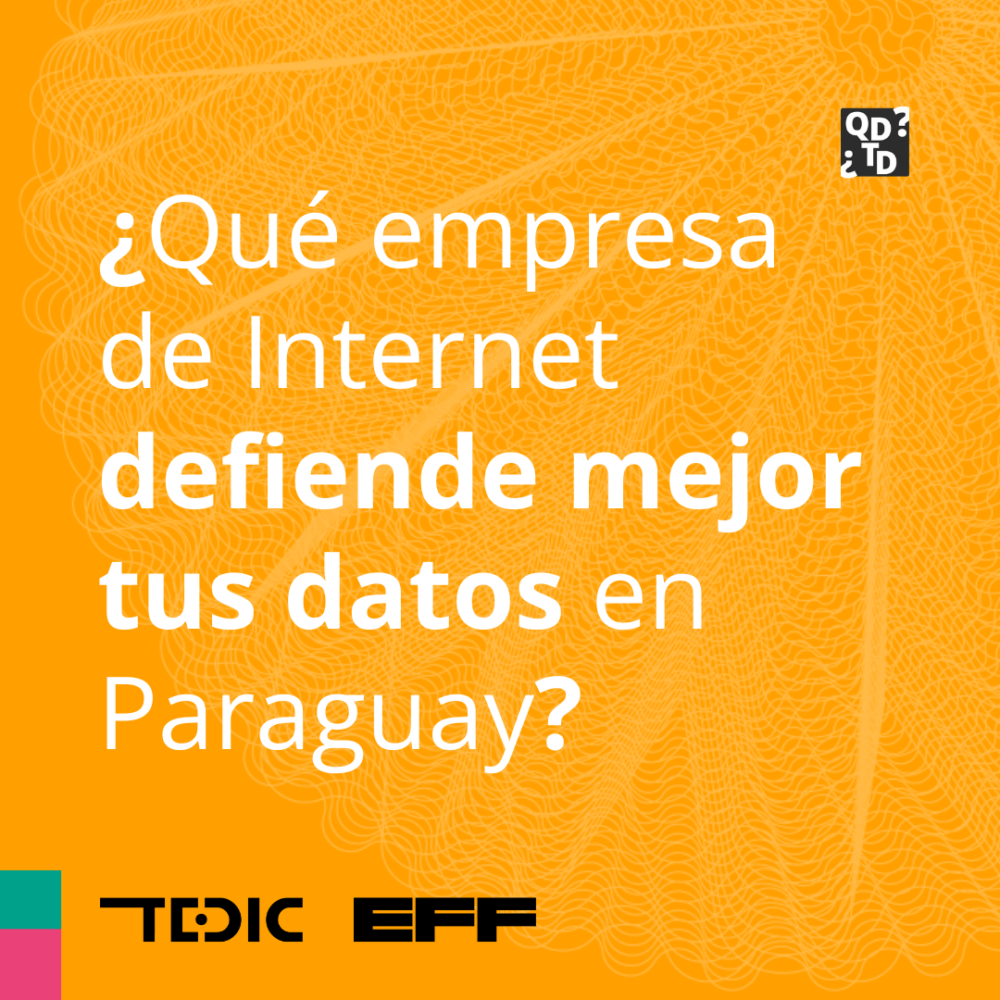
Browsing the internet is part of our daily lives, but we rarely stop to think about what happens to our personal data. Internet service providers (ISPs) like Claro, Tigo, Personal, Vox, and Copaco not only connect us to the internet but also handle sensitive information about all our online activities. What are they doing to protect it? How clear are their privacy policies? How transparent are they when it comes to government requests for user data? Do they provide accessible information on their websites? Do they have any commitment to defending our rights?
At TEDIC, we launched the fourth edition of our Who Defends Your Data? investigation, a project that evaluates the commitment of the main ISPs in Paraguay to privacy, transparency, and the defense of digital rights. This effort, inspired by the “Who Has Your Back” initiative by the Electronic Frontier Foundation (EFF), is tailored to our legal and social realities, analyzing how companies operate in a context where a comprehensive data protection law is yet to be enacted.
What Did We Analyze, and Why Is It Important?
As with previous editions, we evaluated Tigo, Claro, Personal, Copaco, and Vox, companies that dominate the market with over 15,000 customers each. Through seven key categories, we sought to answer questions such as:
- Do they publish clear and comprehensive privacy policies?
- Do they require a court order to hand over user data?
- Do they notify users when their data is requested?
- Do they participate in initiatives to defend digital human rights?
At TEDIC, we believe that evaluating ISPs from a human rights perspective is not optional but essential. Internet access goes beyond being a technological tool; it is an indispensable means for exercising fundamental rights such as freedom of expression, privacy, and social participation. Therefore, ISPs have a duty to be transparent and protect the personal data of those who trust their services.
Key findings of this edition
While some providers have shown progress since the 2022 edition, the overall results still highlight significant challenges:
- Privacy Policies and Personal Data: Only Claro and Tigo provide relatively detailed privacy policies, although issues such as unclear data retention periods persist. Vox continues to lack any publicly available privacy policy.
- Judicial Authorization: Although all companies require a court order to release the content of communications, concerns remain about the protection of metadata, which should also be safeguarded under international standards.
- User Notification: None of the five ISPs notify their customers when authorities request their data, a practice that hinders the exercise of privacy rights and due process.
- Transparency: Only Claro and Tigo publish transparency reports, but these are prepared by their parent companies and do not include Paraguay-specific information.
- Accessibility: Tigo stands out as the leader in web accessibility, while Vox shows the most significant barriers in this area.

Recommendations for change: Challenges and opportunities
These companies have an opportunity to strengthen user trust by addressing persistent challenges in personal data protection, privacy, and transparency. At TEDIC, we propose the following actions as steps toward a safer and more respectful digital environment for human rights:
- Improve Privacy Policies: Policies should be clear, comprehensive, and accessible, with specific information on data retention periods and processing procedures.
- Enhance Transparency with Users: Notifying users about data requests not only builds trust but also empowers them to exercise their rights more effectively.
- Publish Local Transparency Reports: Including detailed information on data requests specific to Paraguay would demonstrate accountability and position ISPs as regional leaders.
- Actively Commit to Digital Rights: Participation in sector initiatives, privacy advocacy, and user education programs can strengthen customer relationships and highlight ISPs as responsible digital actors.
Commitment to privacy and human rights should not be the exception but the standard for all ISPs in Paraguay. Transparency, accountability, and data protection are fundamental to ensuring an inclusive and secure internet.
For more information about Who Defends Your Data?, we invite you to download the full report in spanish.

